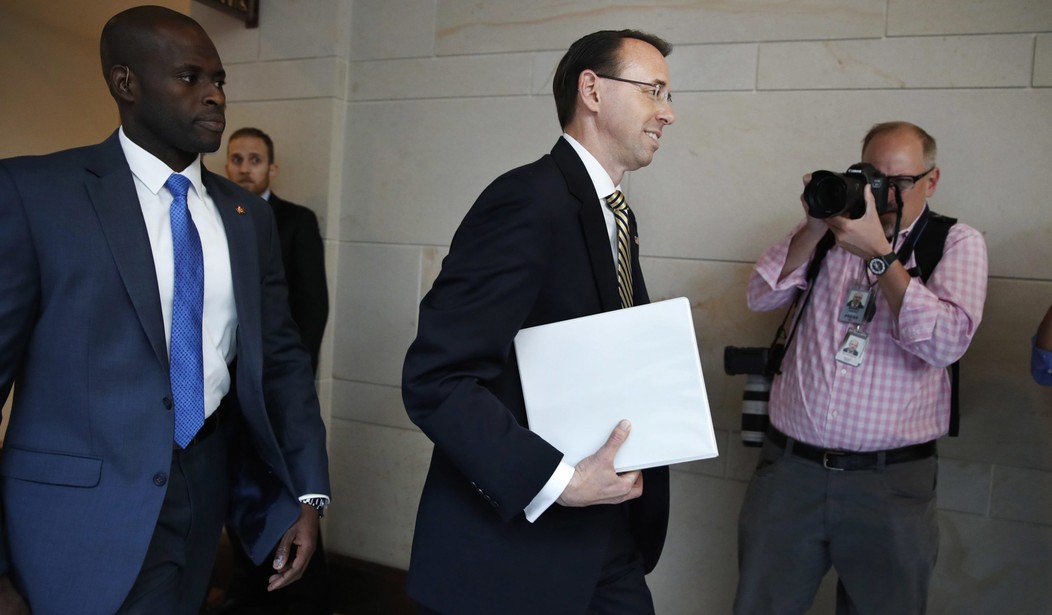WASHINGTON — Deputy Attorney General Rod Rosenstein journeyed to the Capitol today to brief senators on the just-announced special counsel investigation into possible ties between Russia and the Trump campaign, but lawmakers said he offered little information about the firing of former FBI Director James Comey.
“It was a counterintelligence investigation before now, it seems to me now to be considered a criminal investigation,” Sen. Lindsey Graham (R-S.C.) declared outside of the meeting.
“What does that mean for the Congress? I find it hard to subpoena records of somebody, like Mr. Flynn, who may be subject to a criminal investigation because he has a right not to incriminate himself,” he told reporters. “As to Mr. Comey, the former director of the FBI, coming before the committee, if I were Mr. Mueller I would jealously guard the witness pool.”
Rosenstein’s decision to appoint former FBI Director Robert Mueller as special counsel has been well-received by senators, though Graham said “there are a lot of people in that room who were shocked that when a special counsel has been appointed that Congress has limitations on what we can do.”
“The takeaway I had is that everything he said is that you need to treat this investigation as if it may be a criminal investigation,” Graham said. “So I think the biggest legal change seems to be that Mr. Mueller is going to proceed forward with the idea of a criminal investigation, versus the counterintelligence investigation.”
Graham said Rosenstein “talked about why he wrote the memo” detailing Comey’s lapses as FBI director just before Comey was fired, but for “all things related to the process of the memo I think we’ll — you’ll need to talk to Mr. Mueller about that.”
Sen. Claire McCaskill (D-Mo.) said Rosenstein “did acknowledge that he learned Comey would be removed prior to him writing his memo.”
“But he was very careful about not going into any detail surrounding the removal because he wants to give Robert Mueller the opportunity to make his independent decision as to where the investigation leads,” she added.
Congressional leaders have emphasized that House and Senate investigations will continue irregardless of other investigations. Sen. Marco Rubio (R-Fla.) said outside the meeting that the “counterintelligence matter moves forward,” and “it is my hope that they will not be in conflict with one another, and I do not believe that they need to be in conflict with one another.”
On McCaskill’s recollection that Rosenstein said he knew of Comey’s firing before writing the memo, Rubio said, “I’m not sure he addressed that with a level of clarity that most people wanted to hear.”
On Trump’s characterization of the probe as a “witch hunt”: “We’re a nation of laws and we’re going to follow the law,” Rubio said.
Senate Minority Whip Dick Durbin (D-Ill.) said there was confidence within the meeting that Mueller will “always put country first.”
“Mr. Rosenstein to-date answered a lot of questions, but declined to answer a lot as well. And many of the questions he declined to answer came down to his concern about whether he might interfere with the investigation by Director Mueller. So, we left with more information, but not all the information we were seeking,” he said.
Durbin said Rosenstein knew the day before writing the memo that Comey was going to be fired. The deputy attorney did not, he added, indicate whether he was pressured into writing the memo.
“The ultimate responsibility of Director Mueller is to determine whether any laws have been broken and whether any crimes have been committed. And, they have to leave it to him and I trust him. And I do trust him. I want to make that extremely clear to everyone here,” Durbin said.
“I thought the deputy attorney general, Rosenstein, faced a very stark decision. He could either appoint someone of a stature of Director Mueller or resign to protect his own credibility as a professional prosecutor. He made the right decision in appointing Mueller. Mueller now has the responsibility to decide if laws were broken.”
Rosenstein told senators he decided to appoint a special counsel “to make sure that the integrity of the Department of Justice was protected, to make certain the American people felt that this was going to be handled fairly and justly,” Durbin added.









Join the conversation as a VIP Member